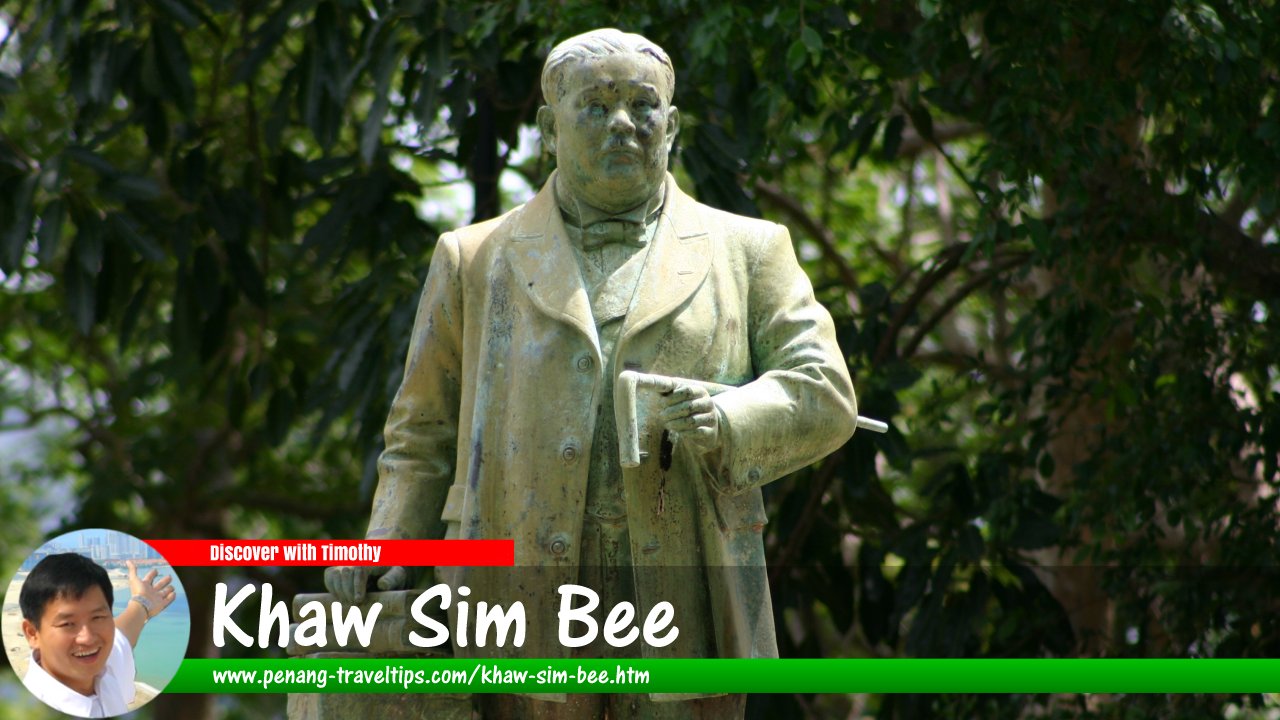 Khaw Sim Bee, also known in Thai as Phraya Ratsadanupradit (12 July 2004)
Khaw Sim Bee, also known in Thai as Phraya Ratsadanupradit (12 July 2004)
Khaw Sim Bee is a famous Penang person who has also made a significant contribution to Phuket, Thailand. In Malaysia his name is written as Khaw Sim Bee while in Thailand he goes by several variations and titles including Phraya Phakdi, Phraya Ratsada, as well as Phraya Ratsadanupradit Maissara Phakdi, while his Chinese name is also spelled Khor Sim Bee, Kho Sim Bee, Koh Chimbi and Ko Sim Bee. Jalan Khaw Sim Bee in George Town was named after him.
Khaw Sim Bee's father Khaw Su Jiang (also written Khaw Soo Cheang in Malaysia), was the founder of the Na Ranong clan and also a well known governor in Ranong, which is a town bordering Myanmar. His elder brother Khaw Sim Khim was the founder of the Khaw clan association in Penang.
The Chinese people emigrated to Thailand when their home province of Fujian Province in South China was gripped with famine and political turbulence around 1853-1932 . They descended on places such as Phuket, Ranong and Trang, where became tin miners and traders.
In Penang, Khaw Sim Bee founded the Koe Guan Company Ltd - it grew to become one of the biggest shipping companies during British Malaya. He also pioneered the insurance industry in Malaya by founding the Khean Guan Insurance Company while holiding an interest in Tongkah Harbour Tin Dredging Co Ltd and Eastern Shipping Co Ltd. Jalan Khaw Sim Bee is a road in Penang named in his honour.
In Thailand, King Rama V Chulalongkorn of Thailand named Sim Bee as Thailand's most successful provincial governor in the 1890s. The next king, Rama VI who went by the title of Vajiravudh also considered Sim Bee close family friend, and conferred on him Thailand's highest honour, the title Phraya Ratsadanupradit Mahisornpakdi or The Grand Cross of the Most Exalted Order of the White Elephant.
What makes Thailand so indebted to Khaw Sim Bee? He almost single-handedly saved the economy of South Thailand by introducing rubber. Since the 1990s, Thailand has become the world's biggest producer of natural rubber, and the credit went to Khaw Sim Bee. In 1899 while being governor of Trang, he noted with a tinge of envy all the new rubber estates being planted in North Malaya. He decided to visit Dutch East Indies (Indonesia) in 1901 where he smuggled back a few dozen rubber seeds. He kept them in wet cotton wool and covered them with newspaper in four boxes aboard his private steamship, and hurried back to Siam.
Back in Siam he planted 18 acres near Trang with rubber, and coerced the local officials to distribute rubber seeds to farmers. Meanwhile in Bangkok, he got the government to rewrite the laws to allow the rice farmers to clear the forest to plant rubber. By 1910, rubber began to play a major role in Phuket's economy. This was a crucial switch when the mainstay of Phuket economy, tin, was hit by dwindling supplies and falling prices.
The rubber was exported through Penang harbour to meet the industrial demands of Britain. Chinese immigrants who arrived in Phuket to work the tin mines switched to rubber tapping. Most of the rubber holdings in Phuket were Chinese owned. Due to Khaw Sim Bee, the Chinese were the only non-Thais allowed to own plantations in South Thailand. While the Thai rubber plantations are usually small family-run holdings, those on the Malayan side are often large estates managed by Indian migrant labor, and owned by the British.
In honour to Khaw Sim Bee's contribution to the Thai economy, a statue of him was erected on Khao Rang Hills overlooking Phuket Town. It is the only statue in Thailand built in honour of a Chinese businessman. [an error occurred while processing this directive]

Copyright © 2003-2025 Timothy Tye. All Rights Reserved.

 Go Back
Go Back